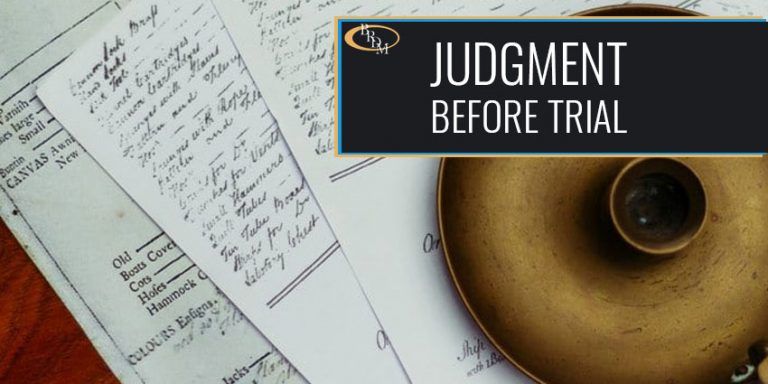Updated February 27, 2025 by Alec Waid
Once the defendant has answered a complaint, a common question for many litigants is whether the lawsuit can be resolved by the trial court without the necessity of a trial.
In Florida, there are two main avenues which allow the trial court to enter a judgment before the case goes to trial. These are commonly known as the trial court entering summary judgment or the trial court entering a judgment on the pleadings.
Table of Contents
Motions for Summary Judgment
A plaintiff or defendant can file a motion for summary judgment, which asks that the trial court enter judgment as a matter of law. Motions for summary judgment can be partial, which means that the motion is attempting to have only one issue, or a set of issues, determined by the trial court instead of the entire case. Motions for partial summary judgment can thus help narrow the issues to be decided at trial. Motions for summary judgment can also seek relief for the entire case – meaning that the whole lawsuit would be resolved without having to conduct a trial.
The summary judgment procedure is set forth in Florida Rule of Civil Procedure Rule 1.510. Rule 1.510 provides that a motion for summary judgment must state the grounds upon which the motion is based with particularity and include the substantial matters of law to be argued. Rule 1.510 sets forth certain criteria for a party moving or opposing entry of summary judgment – including when a plaintiff or defendant can file a motion for summary judgment and deadlines for filing summary judgment evidence.
Summary judgment is proper where there is no genuine issue of material fact and the moving party is entitled to judgment as a matter of law. The burden is on the party who is moving for summary judgment to prove that there are no triable issues for the trial court. In other words, the burden is on the moving party to demonstrate that the nonmoving party cannot prevail. The courts have recognized that this is a heavy burden to meet. A party is entitled to summary judgment only if the record – which includes the pleadings, answers to interrogatories, admissions, depositions, and affidavits – show that there is no genuine issue of material fact. If there is any genuine issue of material fact (or if the record shows even the slightest possibility or doubt that an issue might exist), then summary judgment is improper.
Until the moving party meets this burden of proving the absence of a genuine issue of material fact, the nonmoving party is under no obligation to show that there are issues that need to be tried by the trial court. This means that if a movant fails to establish the nonexistence of material issues with competent evidence, the nonmoving party does not even need to set forth any evidence in opposition to the motion for summary judgment. Otherwise, the nonmoving party will generally argue that there are material facts in dispute which will need to be determined at trial in order to prevent entry of summary judgment.
Further, every possible inference must be construed in favor of the nonmoving party. If the evidence allows for differing inferences by the trial court, then the case should go to trial.
There are also certain considerations which apply when the plaintiff moves for summary judgment. For instance, if a defendant has asserted affirmative defenses, then the plaintiff must either disprove those defenses by evidence or establish that the affirmative defenses are legally insufficient. If there are any issues or facts raised by affirmative defenses which have not been properly challenged by the plaintiff, then summary judgment is improper.
Moreover, a motion for summary judgment should not be granted until the facts have been sufficiently developed to enable the trial court to be reasonably certain that there is no genuine issue of material fact. This effectively means that summary judgment should not be granted until discovery has been completed. If discovery is incomplete, then it is generally improper for summary judgment to be entered.
There are certain legal defenses and theories which are inappropriate for the trial court to consider on a motion for summary judgment. This means that summary judgment may not necessarily be appropriate in each case. However, where the determination of issues depends upon the construction of a written instrument (such as a contract) and its legal effect, this is deemed a matter of law, and the trial court may resolve this matter at summary judgment.
Florida courts are cautious in granting summary judgment, and the trial court will not enter summary judgment unless the facts are so developed that nothing remains but questions of law.Motions for Judgment on the Pleadings
Motions for judgment on the pleadings are less common, but they are still recognized in the State of Florida. Motions for judgment on the pleadings are typically used by defendants.A motion for judgment on the pleadings can only be filed once the pleadings have “closed” – in other words, once the defendant has filed an answer.
In determining whether to enter judgment on the pleadings, the trial court is limited only to the pleadings. Thus, a motion for judgment on the pleadings is appropriate when the complaint fails to state a cause of action. The trial court uses the same legal test as the test used for a motion to dismiss a complaint for failure to state a cause of action.
When ruling on a defendant’s motion, all of the well pled allegations in the plaintiff’s complaint are taken as true. All exhibits attached to the complaint will also be considered. If there is an inconsistency between the complaint allegations and exhibits, the pleading is rendered objectionable.
The trial court will grant a motion on the pleadings only if the moving party is entitled to judgment as a matter of law. It is improper for the trial court to enter a judgment on the pleadings if there are factual questions which need to be resolved.Contact the Civil Attorneys at Battaglia, Ross, Dicus & McQuaid, P.A.
It is important to consult with an experienced civil litigation attorney. The civil lawyers at Battaglia, Ross, Dicus & McQuaid, P.A. have over fifty years of experience in state and federal court and have significant knowledge in resolving a wide range of litigation matters – including drafting, opposing, and arguing motions for summary judgments and motions for judgment on the pleadings. If you are in need of legal assistance, contact our skilled trial lawyers today.



